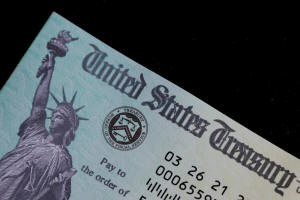Partisan fight brews as forecaster warns U.S. could hit debt limit by
fall
 Send a link to a friend
Send a link to a friend
 [July 22, 2021]
By Richard Cowan [July 22, 2021]
By Richard Cowan
WASHINGTON (Reuters) -The U.S. Treasury
Department is projected to exhaust its borrowing authority in October or
November, the Congressional Budget Office said on Wednesday, as a
partisan fight over raising the nation's debt ceiling erupted in
Congress.
"If that occurred, the government would be unable to pay its obligations
fully, and it would delay making payments for its activities, default on
its debt obligations, or both," the non-partisan CBO said in a
statement.
A failure to work out differences over whether government spending cuts
should accompany an increase in the statutory debt limit, currently set
at $28.5 trillion, could lead to a federal government shutdown - as has
happened three times in the past decade - or even a debt default.
The White House urged Congress to resolve partisan differences, even as
Republicans seized upon the debt limit issue to attack Democrats for
pushing legislation that they say has led to inflation and escalating
public debt.

"We expect Congress to act in a timely manner to raise or suspend the
debt ceiling as they did three times on a broad bipartisan basis during
the last administration," White House spokeswoman Jen Psaki told
reporters.
President Joe Biden's fellow Democrats narrowly control both the Senate
and House of Representatives. No senior Republicans have threatened a
shutdown in recent public statements. Democrats are insisting on a
"clean" debt limit increase unfettered by a fight over spending
reductions.
The top Senate Republican, Mitch McConnell, said on Wednesday that
members of his party would be unlikely to support a debt limit increase
given the current Democratic drive for a multi-trillion-dollar
infrastructure investment bill.
"I can't imagine there will be a single Republican voting to raise the
debt ceiling after what we've been experiencing," McConnell told the
Congress-focused Punchbowl News.
But Republican Senator Mike Rounds, for one, noted he has voted for debt
ceiling increases in the past and said, "My personal opinion is that
once we have acquired the debt, we are responsible for the debt and you
need to address the debt."
McConnell suggested Democrats handle a debt limit increase in a second
spending measure they are expecting to pass without Republican votes in
a maneuver called reconciliation.
Senate Majority Leader Chuck Schumer called McConnell's remarks
"shameless, cynical and totally political." Schumer said Republicans did
not raise such concerns during the presidency of Republican Donald Trump
and that some of the debt is related to emergency aid for the COVID-19
pandemic.
[to top of second column]
|

A family's stimulus check from the U.S. Treasury for the coronavirus
disease (COVID-19) aid arrived in the mail in Milton, Massachusetts,
U.S., March 25, 2021. REUTERS/Brian Snyder

SIGNS OF WALL STREET WORRY
The Treasury Department on July 31 technically bumps up against its
statutory debt limit. Much like a personal credit card maximum, the
debt ceiling is the amount of money the federal government is
allowed to borrow to meet its obligations. These range from paying
military salaries and IRS tax refunds to Social Security benefits
and even interest payments on the debt.
Since the government spends more than it receives in revenues, it
keeps operating by borrowing more and more.
For many years, the statutory debt limit was raised to a specific
dollar level. More recently, Congress has set the limit to a
specific date in the future.
Lawmakers often try to extend borrowing authority to beyond the next
U.S. election so that it does not become a campaign issue. The
midterm elections that will determine whether Democrats retain
control of Congress are set for November 2022.
If Congress does not raise the debt ceiling from its current $28.5
trillion by the time that the Treasury Department's borrowing
authority runs out, Treasury Secretary Janet Yellen is expected to
take special steps to avoid a government default. Such stop-gap
measures are effective for only a short period.
Failure to raise the debt ceiling could lead to a repeat of the
government shutdowns that occurred in 2013, January 2018 and 35 days
from late December 2018 into January 2019. Other factors also were
in play during those disruptions.

In a sign of Wall Street's worry about the approaching limits,
yields on short-term U.S. Treasury debt have inched up to around
0.05%, after having hovered near zero since early in the pandemic.
(Reporting by Richard Cowan; Editing by Scott Malone and Cynthia
Osterman)
[© 2021 Thomson Reuters. All rights
reserved.] Copyright 2021 Reuters. All rights reserved. This material may not be published,
broadcast, rewritten or redistributed.
Thompson Reuters is solely responsible for this content. |